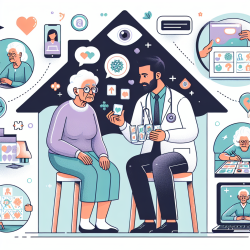As a practitioner dedicated to improving the lives of individuals with Alzheimer's Disease (AD), staying updated with the latest research and implementing evidence-based interventions is crucial. The study "Home-Based Electronic Cognitive Therapy in Patients With Alzheimer Disease: Feasibility Randomized Controlled Trial" by Mavragani et al. offers valuable insights into the feasibility and potential benefits of long-term, home-based cognitive therapy using the Constant Therapy app.
Key Findings from the Study
The research aimed to assess the feasibility of a 24-week home-based intervention program using the Constant Therapy app and its preliminary efficacy on cognition in patients with AD. Here are some key findings:
- High Adherence Rates: The study found an 80% adherence rate over 24 weeks, indicating that patients with AD are willing and able to engage with the Constant Therapy program consistently.
- Improved Cognitive Performance: Participants showed significant improvements in task accuracy and latency, particularly in visual and auditory memory, attention, and arithmetic tasks.
- Transfer to Neuropsychological Tests: Gains made using the Constant Therapy app were observed to transfer to neuropsychological test performance, specifically in coding abilities.
Implementing Home-Based Cognitive Therapy
As a practitioner, you can leverage these findings to enhance your therapeutic interventions. Here are some steps to consider:
- Introduce Constant Therapy: Recommend the Constant Therapy app to your patients with mild cognitive impairment or mild dementia due to AD. Ensure they have access to a tablet and provide initial training on using the app.
- Monitor Progress: Regularly check in with your patients to monitor their progress and address any challenges they may face. Encourage them to use the app daily for about 30 minutes.
- Evaluate Outcomes: Use neuropsychological assessments to evaluate the impact of the therapy on cognitive performance and daily functioning. This will help you tailor the intervention to each patient's needs.
Encouraging Further Research
While the study provides promising results, further research is needed to explore the long-term efficacy of home-based cognitive therapy in larger, more diverse populations. Encourage your colleagues and research institutions to conduct additional studies to validate and expand upon these findings.
To read the original research paper, please follow this link: Home-Based Electronic Cognitive Therapy in Patients With Alzheimer Disease: Feasibility Randomized Controlled Trial.










